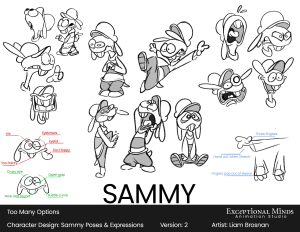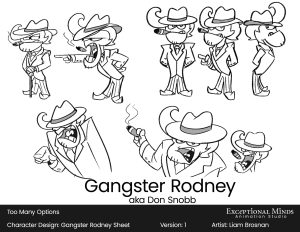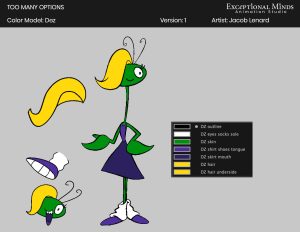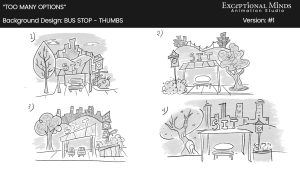Jacob Lenard explores self-expression in animation with Too Many Options
In Jacob Lenard’s Too Many Options, three friends at a bus stop discuss their favourite foods. When asked to name his own favourites, Sammy is sent into a tailspin as he becomes overwhelmed with infinite possible answers. This short uses the medium of animation to explore a neurodivergent experience that can be difficult to articulate. Using the medium of animation, the audience is taken into Sammy’s mind, where the emotional stakes of his analysis paralysis become clear.
Too Many Options was produced by Exceptional Minds, a non-profit academy and studio that prepares young adults on the autism spectrum for careers in animation, VFX, and game development, among other disciplines in the entertainment industry. The animation team behind Too Many Options are all graduates of Exceptional Minds.
We interviewed Jacob to learn more about the short, his collaboration with a crew of neurodivergent artists, and how animation can be used for expressing internal experiences.
Created by Exceptional Minds Animation Studio artists, Too Many Options is the first of entry in the Autism Enlightenment Library, to help the public understand individuals on the autism spectrum and appreciate them for who they are.
What got you into animation? And what has your career path looked like up to this point?
Jacob: I've been animating in one way or another my whole life, directing hundreds of my own shorts on my own. I come up with an idea, I do all the animation, I direct the voices, and I score the music. How things move is how I get a feel for the world. I learn more about something through the way it moves than just it sitting there.
I was born and raised in Buffalo, New York making hundreds of animated shorts in my parents' basement. If animation was going to be my career, however, it wouldn't be happening there.
My family moved to Los Angeles mainly so I could attend Exceptional Minds. Having gone to school there and worked in the studio since 2018, it was a great opportunity to direct this short.
This was your directorial debut, in some ways.
Jacob: I guess, in this context. It’s the first time I led a team and went through a pipeline.

How did leading a team differ from your usual process? What were some of the highlights and some of the challenges?
Jacob: Well, my usual process is total chaos. I have a feeling in my head that I just put out somehow. I don't really storyboard, and I only write scripts if I need others to record dialogue. I feel my way through, and if something’s not working, then I just find another way of conveying the same idea.
This was very different in that each step of the way everything had to be locked down. It had this script finalized, recorded storyboard, animatic, rough animation, colour, cleanup. We then added tones and highlights, and edited this all together as we were going.
My draftsmanship isn't exactly my strength, per se, so it's great to have people who can do the work that I'm not really cut out to do. The crew weren't just my coworkers, these are people I've had rapport with for years. I'm working with my friends who I know well and love even outside of work.
After spending so much time with them, I already know what all their strengths are and how to get the best result out of them without them needing to compromise anything.
Working with an all-neurodivergent team must have streamlined the process.
Jacob: Yeah. We speak the same language that no one else seems to. We have the same minds from different backgrounds.

Too Many Options is about the common autistic experience of being overwhelmed by choice. Why did you choose to explore this concept in particular?
Jacob: It's what I know better than anything else. This is the story of my life.
Words aren't as much of a language as feelings are; what I'm thinking and feeling. I can’t easily make it digestible. The mystery of being human is not having all the answers, and is what makes life exciting. If I have to explain myself in words, then it feels dehumanizing.
Maybe animation is a better communication tool for those concepts than language at times.
Jacob Lenard: Undoubtedly, it's a language in itself.
Another thing I like about animation is that it's a sequence of things that don't really work the same in words, or with a single image. You know, I've never really been into comic books because it's not moving. It's the stuff that happens in between that interests me most.
Plot means nothing to me on its own. A story is only as good as how it's told.

And you told this story with familiar characters, who you've developed previously?
Jacob Lenard: There’s Sammy, Dez, and Rodney. One day I just drew each of them out of the blue, and somehow they took on a life of their own. And I mean Sammy is pretty much just me.
All these characters started as something different, but over time shaped into something that means a lot to me. I've already been making shorts with these characters for years, and they evolve with me over time. Heck, their characterization in this short already feels a bit different from where I see them now.
We’ve got Sammy, who's this weird, rodent-looking guy, and Dez was like a one-eyed praying mantis with a long neck. And then you got Rodney, who's just... really, it doesn't matter what they are. It's just who they are, just by looking at them and seeing them in motion. You're not really supposed to question or break down what or who they are. It's just, “This is who they are and what they feel like at this very moment, and how they all talk to each other.”
I voiced Sammy. My good friend Alyssa Maxwell Zelman voices Dez (and freaking kills it with all the ad-libbing) while Ryan Oldis does Rodney. Both are also friends from Exceptional Minds. You're supposed to feel them from what you see on screen.
Most of the time when I animate them, their proportions will warp from one frame to the next. Individual frames on their own may look strange, but in motion, it just feels so right. Having to make a definitive character model sheet was difficult, because these characters are always evolving and shifting over time. My good friend, Liam Brosnan, managed to pull it off. He made full character turnarounds and pose sheets using various drawings I've made of these characters over the years.
There is some metaphorical resonance in a short about the autistic experience with characters who the audience may not understand visually, but hopefully will emotionally.

When you're dealing with someone who's very different from you, you don't need to understand everything. You just roll with it.
Jacob: That’s more or less what I've been thinking all along with these characters. Thank you for putting that into words.
- For more information about Exceptional Minds, visit the studio's website. You can also find their work on Instagram, and YouTube.
- Ready to use 2D animation to explore the inner recesses of your own mind? Artists can download a 21-day trial of Toon Boom Harmony Premium.
The post Jacob Lenard explores self-expression in animation with Too Many Options appeared first on Toon Boom.
